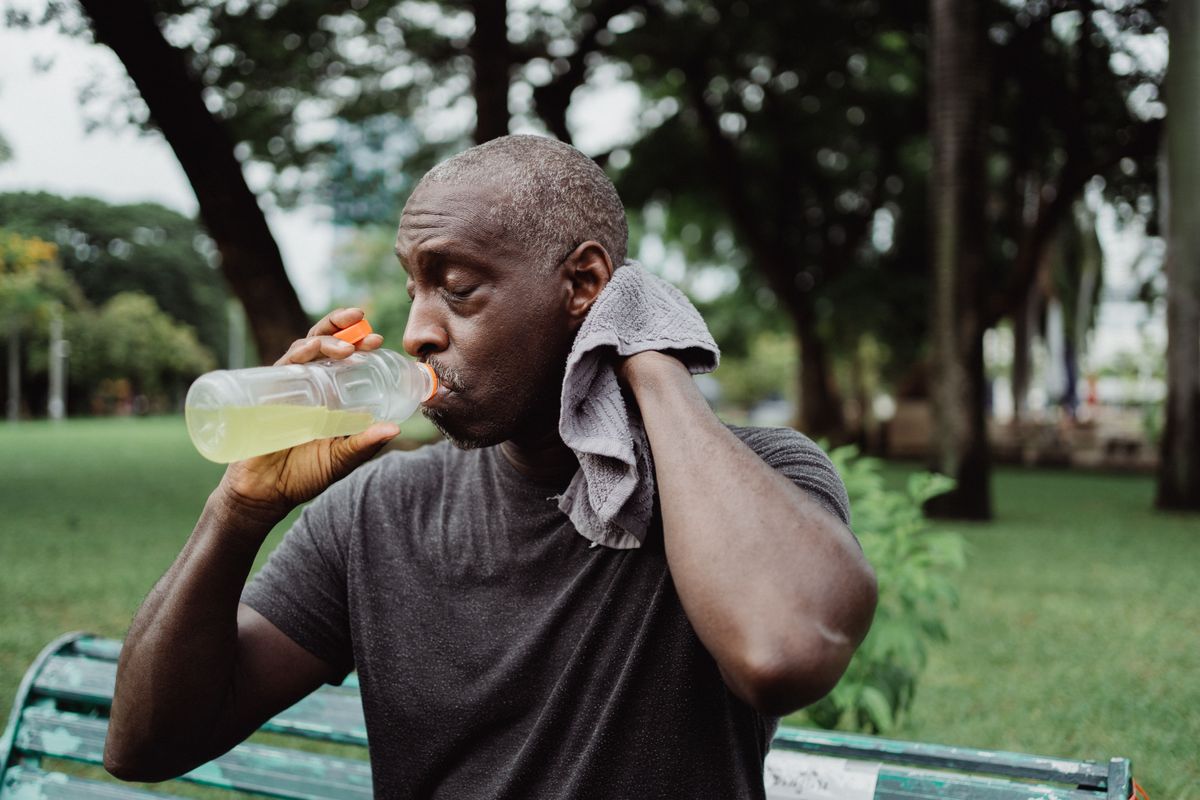Dehydration in the Elderly: What You Need to Know
As we age, it can become even easier to become dehydrated. Seniorly breaks down everything you need to know about how to keep older adults in your life hydrated - from spotting symptoms to preventing dehydration in the first place.

If you're caring for an older adult, it's more than likely you have a lot of things on your mind. From nutrition to exercise, medication management to socialization, there are so many things you're managing at once. Yet one commonly overlooked factor is something many of us take for granted - the ability to stay hydrated. Severe dehydration - or even moderate dehydration - is a serious concern for older adults, especially for those who are managing chronic illnesses.
Dehydration symptoms in elderly people: what to look for

Understanding the symptoms of dehydration in the elderly is crucial. The good news is that studies have identified the most common clues to help us know when our loved ones are dehydrated:
- Increased thirst and dry mouth: Yes, it may sound obvious, but seniors who are dehydrated are going to be thirsty. This might manifest as thirst, or it might feel like a dry or sticky mouth. Either way, this condition can make it hard to swallow, speak, and sometimes even breathe.
- Changes in urine: Older adults dealing with even mild dehydration might not urinate as frequently or their urine may be darker in color. This happens because the body is trying to retain as much water as it can.
- Fatigue and confusion: Dehydration in older adults may lead to severe fatigue or mental confusion. This happens because the blood circulation of a dehydrated person is decreased. This reduction in blood volume reduces the amount of oxygen carried to the brain, leading to symptoms of fatigue and confusion.
- Constipation: Elderly people with dehydration may suffer from constipation. The body needs a significant amount of water to function properly and digest food. If an older adult is not drinking enough, the body will pull water from the stool to compensate for the lack of hydration
- Lethargy: One notable symptom of dehydration in older adults can be lethargy or lack of energy. This occurs because water is essential for every cell to function suitably. When the body is dehydrated, the cells cannot function properly, which may result in an overall feeling of lethargy and weakness.
- Dizziness: Older adults suffering from dehydration often report feeling dizzy or lightheaded. This happens because dehydration decreases the total volume of blood in the body, leading to a drop in blood and oxygen supplied to the brain which can cause momentary dizziness.
- Low blood pressure: Dehydration can also result in low blood pressure in the elderly. This occurs due to the reduced amount of blood flow in the body, as the body has less water to use for circulation. This can potentially cause weakness, light-headedness, and in severe cases, fainting.
- Rapid heart rate: Rapid heart rate, or tachycardia, is another common symptom of dehydration in older adults. When the body is dehydrated, the decrease in blood volume may cause the heart to pump faster trying to provide an adequate amount of oxygenated blood to the body's tissues, resulting in a faster than normal heart rate
- Falls: Dehydration can significantly increase the risk of falls in older adults. This is due to a combination of symptoms often brought on by dehydration: dizziness, lethargy, low blood pressure, and rapid heart rate can all contribute to instability, loss of balance, or fainting. Over time, this can lead to a greater chance of falls, further complicating the physical health of the elderly individual.
- Urinary tract infections (UTIs): Severe dehydration in the elderly population can lead to an increased risk of urinary tract infections (UTIs). This is because sufficient fluid intake helps to regularly flush out the urinary system, preventing the build-up of bacteria that can cause urinary and kidney problems. In the case of dehydration, urine is concentrated and less frequent which allows bacteria more opportunity to multiply and potentially lead to a UTI.
Common causes of dehydration in the elderly

Dehydration can be caused by so many different factors, but in older adults it may be more complicated because of other age-related health conditions., often making them more susceptible than younger individuals. Risk factors like diabetes or kidney diseases, which are prevalent among seniors, can also contribute to rapid fluid loss. Recognizing these factors and working to stop dehydration before it happens, is key.
Age-related causes
- Reduced thirst sensation: Science tells us that the body's anti-diuretic hormone (ADH) levels lessen as we age, and subsequently, the sensation of thirst can decrease. An elderly person might not feel thirsty even though their body requires water, which would lead to inadequate fluid intake, causing dehydration.
- Kidney function decline: As we age, the kidneys become less effective at core functions, including the ability to conserve water and filter toxins. Elderly people are often at risk of kidney diseases such as Chronic Kidney Disease, which reduces the functionality of the kidneys. Lack of proper kidney function can lead to dehydration as the body’s water balance mechanism is disrupted.
- Dysphagia: Dysphagia is a condition in which people have difficulty or discomfort in swallowing, at times even simple liquids like water. Dysphagia may make it harder for people to be able to drink water, and dehydration actually exacerbates the condition, as proper hydration is needed to produce the saliva that lubricates the mouth and throat as we swallow.
- Medication side effects: Older people often have to rely on multiple medications for various conditions. Some of these medications might act as diuretics or lead to increased sweating, leading to rapid water loss. These side effects can easily contribute to dehydration unless fluid intake is increased to compensate.
Lifestyle causes
- Mobility challenges: Some elderly people may experience physical conditions or disabilities that prevent them from accessing water easily. Mobility issues can often make it more difficult for these folks to stay hydrated, according to researcher Merin Thomas. For example, a senior who struggles to stand may not be willing to get up and get water, even if they’re thirsty.
- Incontinence and associated fluid-limiting practices: One study reports that older adults dealing with urinary incontinence might limit their fluid intake to avoid common issues such as frequent urination and associated accidents. However, this practice can inadvertently cause a reduction in the body's necessary fluid levels. It's crucial that caregivers understand the risks associated with such strategies and take alternative measures to manage incontinence without risking dehydration.
- Hydration strategy: While convenient for younger adults, those oversized water bottles that help us to drink 64 ounces a day can sometimes prove challenging for older adults to handle, especially if they have arthritis or other grip issues. While using smaller containers may make it easier for older adults to manage, such containers may also make it more difficult for them to track how much water they've consumed.
- Heat Exposure: Older adults who live in warmer climates like Florida, California or Arizona may accidentally become dehydrated during outdoor time due to sweating. During the hotter months, ensuring that older adults stay in air-conditioned or cooler spaces can be beneficial in maintaining their hydration levels.
How to prevent dehydration in older adults

It won't come as a surprise that the best way to treat dehydration in older adults is to focus on replenishing lost fluids. This can be accomplished by increasing fluid intake, either orally or intravenously in severe cases. Water is usually the first choice, but beverages that contain electrolytes may also be administered to replace lost fluids and salts that are needed to stay in balance.
- Hydration regimen: We all know the rule well: older adults should be drinking fluids - at least eight 8-ounce glasses of water a day. This could often be combined with meals or medications for easier remembrance.
- Offer small glasses of water: Many seniors find small glasses of water easier to grip than large ones. Small glasses may also feel less overwhelming for seniors who don’t want to drink water.
- Keep it tasty: Incorporate fruits like watermelon, cucumbers, or oranges into the diet, as they contain high water content and can help prevent dehydration. You can also flavor water with fresh fruit juice or make infused water using pieces of fruit. These approaches make water more enjoyable to drink.
- Use a humidifier: If living in dry climates, the use of humidifiers can be instrumental in preventing dehydration. They help to maintain a moisture-rich environment indoors, which can prevent water loss from the skin and body, thus helping to keep the elderly adequately hydrated.
- Avoid caffeine and alcohol: Older adults should limit their intake of both alcohol and caffeine, as both these substances can lead to increased urine production, which could potentially exacerbate dehydration. Instead, they should opt for healthy, hydrating alternatives such as herbal teas, fresh fruit juices, or simply water.
- Set reminders: To ensure regular water intake, seniors could benefit from setting timers as reminders to drink fluids throughout the day. This can be particularly useful to those who might forget or neglect hydration, helping them maintain a healthy fluid level and prevent dehydration.
- Maintain cooler home temperatures: Keeping home temperatures on the cooler side can assist in preventing dehydration. High temperatures can cause excessive sweating leading to rapid water loss, so a cooler environment can help maintain the body's water balance and decrease the risk of dehydration.
While dehydration can be dangerous for the elderly, there is so much we can do to prevent it and manage hydration. As our loved ones age, their bodies become more vulnerable to the effects of dehydration, making it essential for us to be vigilant in ensuring they receive an adequate intake of fluids. By understanding the signs and symptoms of dehydration, implementing preventative measures, and regularly monitoring their hydration levels, we can help prevent the detrimental consequences of dehydration and provide our elderly population with the care, support, and quality of life they deserve. Let us prioritize their wellbeing and work together to keep them hydrated, healthy, and thriving in their golden years.
Works consulted:
Marlena del Hierro earned her Master of Arts degree in Gerontology from San Francisco State University and her Bachelor of Arts degree in Human Development from California State University. She also serves in an advisory capacity for Jukebox Health. Marlena is a vocal advocate for evolving the aging paradigm, and is a frequent contributor to public discussions about aging. She has served as a resource for media outlets like WGBH, FOX News, CNBC and the Today Show.
To learn more about Seniorly's editorial guidelines, click here.
Sign up for our Healthy Aging Handbook
Seniorly’s Senior Living advisors created a comprehensive handbook to help people age happily while ensuring they love where they live. Enter your email address below to receive your copy and learn more about Healthy Aging and Senior Living.*
*By submitting your email address above, you consent to receive occasional email communications from Seniorly, including educational content and tips, newsletters, and other relevant updates and offerings. You can unsubscribe at any time and we will never sell or distribute your email address to a third party. You can view our Privacy Policy here.
